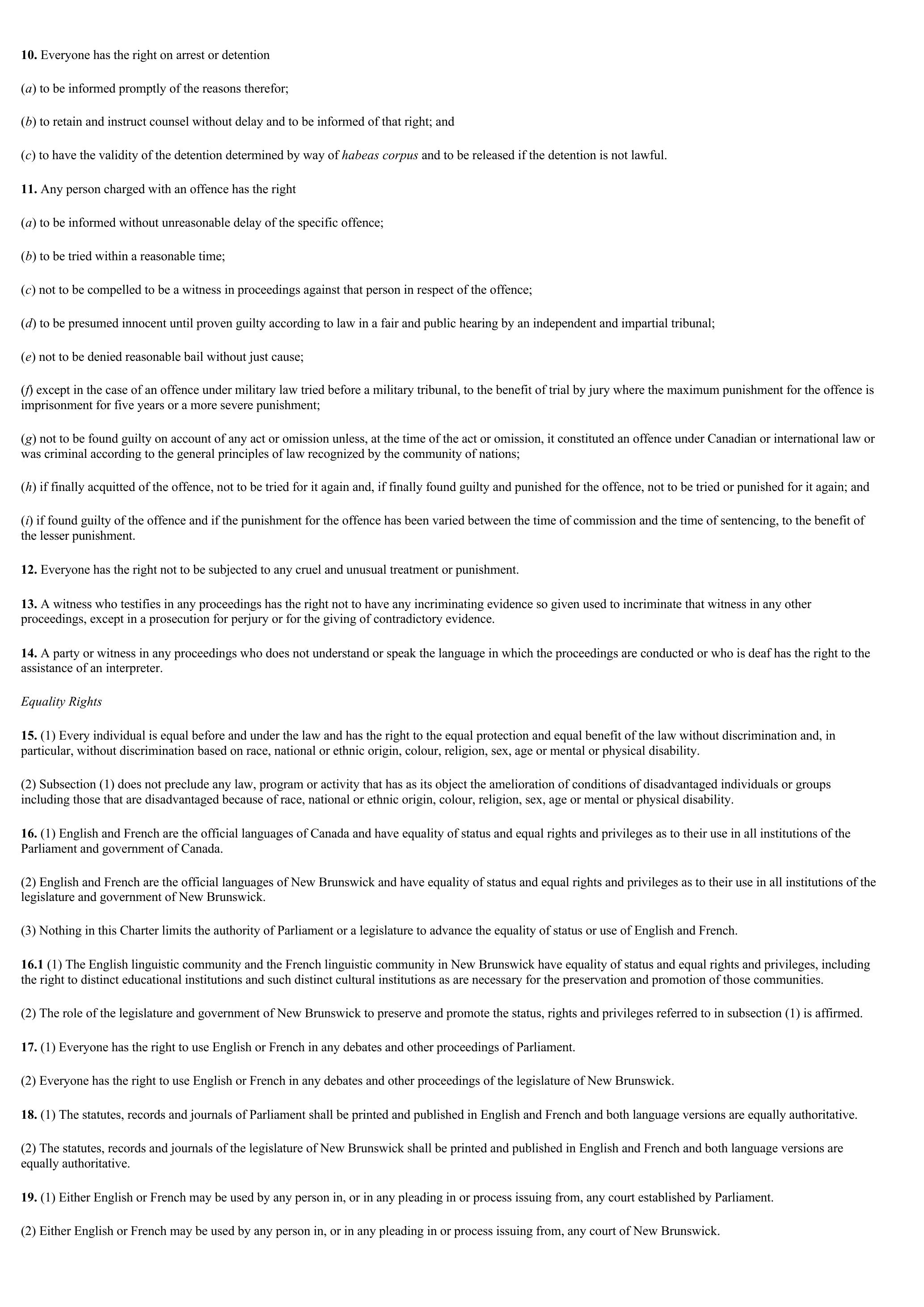Canada's Constitution Act of 1982 In 1982 the Canadian constitution was patriated, meaning it was brought further under Canadian control.
Publié le 26/05/2013
Extrait du document


«
10.
Everyone has the right on arrest or detention
(a) to be informed promptly of the reasons therefor;
(b) to retain and instruct counsel without delay and to be informed of that right; and
(c) to have the validity of the detention determined by way of habeas corpus and to be released if the detention is not lawful.
11.
Any person charged with an offence has the right
(a) to be informed without unreasonable delay of the specific offence;
(b) to be tried within a reasonable time;
(c) not to be compelled to be a witness in proceedings against that person in respect of the offence;
(d) to be presumed innocent until proven guilty according to law in a fair and public hearing by an independent and impartial tribunal;
(e) not to be denied reasonable bail without just cause;
(f) except in the case of an offence under military law tried before a military tribunal, to the benefit of trial by jury where the maximum punishment for the offence isimprisonment for five years or a more severe punishment;
(g) not to be found guilty on account of any act or omission unless, at the time of the act or omission, it constituted an offence under Canadian or international law orwas criminal according to the general principles of law recognized by the community of nations;
(h) if finally acquitted of the offence, not to be tried for it again and, if finally found guilty and punished for the offence, not to be tried or punished for it again; and
(i) if found guilty of the offence and if the punishment for the offence has been varied between the time of commission and the time of sentencing, to the benefit ofthe lesser punishment.
12.
Everyone has the right not to be subjected to any cruel and unusual treatment or punishment.
13.
A witness who testifies in any proceedings has the right not to have any incriminating evidence so given used to incriminate that witness in any otherproceedings, except in a prosecution for perjury or for the giving of contradictory evidence.
14.
A party or witness in any proceedings who does not understand or speak the language in which the proceedings are conducted or who is deaf has the right to theassistance of an interpreter.
Equality Rights
15.
(1) Every individual is equal before and under the law and has the right to the equal protection and equal benefit of the law without discrimination and, inparticular, without discrimination based on race, national or ethnic origin, colour, religion, sex, age or mental or physical disability.
(2) Subsection (1) does not preclude any law, program or activity that has as its object the amelioration of conditions of disadvantaged individuals or groupsincluding those that are disadvantaged because of race, national or ethnic origin, colour, religion, sex, age or mental or physical disability.
16.
(1) English and French are the official languages of Canada and have equality of status and equal rights and privileges as to their use in all institutions of theParliament and government of Canada.
(2) English and French are the official languages of New Brunswick and have equality of status and equal rights and privileges as to their use in all institutions of thelegislature and government of New Brunswick.
(3) Nothing in this Charter limits the authority of Parliament or a legislature to advance the equality of status or use of English and French.
16.1 (1) The English linguistic community and the French linguistic community in New Brunswick have equality of status and equal rights and privileges, including the right to distinct educational institutions and such distinct cultural institutions as are necessary for the preservation and promotion of those communities.
(2) The role of the legislature and government of New Brunswick to preserve and promote the status, rights and privileges referred to in subsection (1) is affirmed.
17.
(1) Everyone has the right to use English or French in any debates and other proceedings of Parliament.
(2) Everyone has the right to use English or French in any debates and other proceedings of the legislature of New Brunswick.
18.
(1) The statutes, records and journals of Parliament shall be printed and published in English and French and both language versions are equally authoritative.
(2) The statutes, records and journals of the legislature of New Brunswick shall be printed and published in English and French and both language versions areequally authoritative.
19.
(1) Either English or French may be used by any person in, or in any pleading in or process issuing from, any court established by Parliament.
(2) Either English or French may be used by any person in, or in any pleading in or process issuing from, any court of New Brunswick..
»
↓↓↓ APERÇU DU DOCUMENT ↓↓↓
Liens utiles
- Canadian Literature I INTRODUCTION Canadian Literature, literature of the peoples of Canada.
- Grey Cup Champions The first Grey Cup was played in 1909 and was awarded for the Rugby Football Championship of Canada.
- Indian Act of Canada - Canadian History.
- litterature.pdf : The play Macbeth was written by William shakespeare
- how was life under Louis-Napoleon Bonaparte?

































